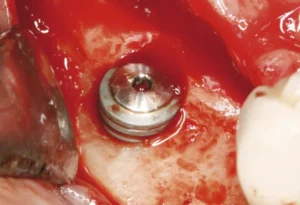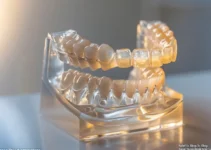Dental implant suppuration is a critical concern for both patients and dentists, involving the potential infection at the site of a dental implant. This condition, often characterized by the discharge of pus, can be a significant indicator of infection which may jeopardize the success of the implant. Effective management focuses on early detection and proper hygiene practices to prevent bacterial accumulation. Additionally, timely consultation with a dental specialist ensures the implementation of appropriate interventions, ranging from antibiotic therapy to potentially more invasive corrective procedures, depending on the severity of the suppuration. Understanding the causes, symptoms, and treatments is essential for maintaining the long-term health of dental implants.
Understanding Dental Implant Suppuration
Dental implant supuration is a crucial issue that can significantly impact the success of dental implants. It involves the formation of pus and is generally an indication of an infection or an inflammatory response around the implant site. While dental implants have a high success rate, understanding the factors that lead to complications such as supuration is essential for both patients and practitioners. Recognizing the early signs of dental implant supuration can lead to timely interventions, which are vital to preserving the integrity and functionality of the implant. This article delves into the nuances of dental implant supuration, its causes, and the best ways to manage and prevent it.
Moreover, addressing dental implant supuration early can prevent more severe complications, such as peri-implantitis, which can eventually lead to implant failure. Hence, a comprehensive understanding of this issue is indispensable for maintaining oral health and ensuring the long-term success of dental implants.
What is Dental Implant Suppuration?
Dental implant supuration refers to the discharge of pus from the area surrounding a dental implant. This is often a sign of an underlying infection that could compromise the implant’s stability. The condition can be caused by several factors, including poor oral hygiene, peri-implantitis, or even complications during the surgical procedure. When an infection occurs around a dental implant, the body’s natural defense mechanism triggers an inflammatory response, leading to pus formation. This pus consists of white blood cells, dead tissues, and bacteria. Recognizing the condition early and seeking immediate treatment can help mitigate further damage.
It’s vital to note that supuration is not just a cosmetic issue but a serious health concern. The presence of pus signifies that the immune system is fighting off an infection, which, if left untreated, can spread to surrounding tissues and even the bone. This can lead to more severe conditions, such as bone loss and ultimately, implant failure.
Understanding the underlying causes and symptoms of dental implant supuration can equip patients and healthcare providers with the knowledge necessary to prevent and treat this condition effectively. This will not only enhance the longevity of the implant but also improve the overall oral health of the patient.
For more detailed information on dental implant care and to explore related topics, be sure to read our other articles. Staying informed is the first step to maintaining a healthy, beautiful smile.
Causes and Risk Factors of Dental Implant Suppuration
Dental implant suppuration, or the formation of pus around a dental implant, can significantly compromise the success of an implant procedure. Understanding the underlying causes and risk factors is crucial to both prevention and effective treatment. This section explores some of the most common factors that contribute to dental implant suppuration.
Poor Oral Hygiene
One of the most significant causes of dental implant suppuration is poor oral hygiene. When patients fail to maintain a rigorous cleaning routine, plaque and bacteria can accumulate around the implant site. This can lead to peri-implantitis, an inflammation of the gum and bone surrounding the implant. Poor oral hygiene is often characterized by:
- Infrequent brushing and flossing
- Neglecting professional dental cleanings
- Improperly cleaning around the implant
Ensuring proper oral hygiene is essential not only for the prevention of peri-implantitis but also for overall oral health. Studies have shown that maintaining good oral hygiene can significantly reduce the risk of implant-related infections and complications.
Smoking and Tobacco Use
Smoking and the use of tobacco products is another critical risk factor for dental implant suppuration. Tobacco can impair circulation and reduce the body’s ability to heal, thereby increasing the likelihood of infection. Several studies have indicated that smokers have a higher rate of implant failure compared to non-smokers. The reasons include:
- Reduced blood flow to the gums and bone
- Compromised immune response
- Increased susceptibility to infections
Quitting smoking before undergoing dental implant surgery can markedly improve the chances of a successful outcome. Patients are encouraged to cease tobacco use entirely to maximize the longevity of their implants and minimize complications.
Pre-existing Health Conditions
Certain pre-existing health conditions can predispose individuals to dental implant suppuration. Conditions such as diabetes, osteoporosis, and autoimmune disorders can impair the healing process and increase the risk of infection. The following points illustrate the impact of these conditions:
- Diabetes: High blood sugar levels can impair white blood cell function, reducing the body’s ability to fight infection.
- Osteoporosis: Weakened bone structure can make it challenging for the implant to integrate properly with the jawbone.
- Autoimmune disorders: Medications and the conditions themselves can compromise the immune system, making it harder for the body to heal post-surgery.
Managing these conditions effectively and coordinating care between medical professionals can help mitigate these risks. Pre-surgical evaluations and tailored treatment plans are essential for patients with chronic health issues to ensure the best possible outcomes for their dental implants.
Understanding and addressing the causes and risk factors of dental implant suppuration is essential for maintaining oral health and ensuring the longevity of your dental implants. For further reading on related topics, explore our other articles to stay informed and proactive about your dental health.
Managing and Preventing Infection
In the field of implantology, managing and preventing infection is paramount for the long-term success of dental implants. The oral environment is a complex ecosystem where bacteria are always present, making it essential to incorporate stringent hygiene practices. Infections around dental implants can lead to complications such as peri-implantitis, which, if left untreated, may cause implant failure.
Effective infection management involves both preoperative and postoperative strategies. Preoperative measures include assessing the patient’s overall health and existing oral hygiene. Postoperative care focuses on maintaining a clean environment around the implant site. By implementing these measures, the risk of infection can be significantly minimized, thus enhancing the longevity of the implants.
The use of antimicrobial agents and antibiotics can also play a crucial role in preventing infections. However, they should be used judiciously to avoid antibiotic resistance. Educating patients about the importance of oral hygiene and regular dental check-ups is equally important in the prevention of implant-related infections.
Proper Implant Care
Proper implant care is indispensable for avoiding infections and ensuring the longevity of dental implants. One of the most fundamental aspects is maintaining excellent oral hygiene. Patients should be advised to brush their teeth at least twice a day and use an antiseptic mouth rinse to reduce bacterial load around the implant site.
Flossing is equally important and should not be neglected. Special interdental brushes can be used to clean the areas where regular toothbrushes might not reach. Additionally, the use of water flossers can be highly beneficial in removing food particles and plaque from hard-to-reach areas around the implants.
- Brush at least twice daily using a soft-bristled toothbrush.
- Use an antiseptic mouth rinse for added protection against bacteria.
- Floss daily, employing special tools if necessary for interdental spaces.
- Consider using water flossers for a more thorough cleaning.
Patient education is critical when it comes to proper implant care. Dentists should provide detailed instructions and possibly even demonstrate the correct techniques for brushing, flossing, and rinsing. Regular follow-up appointments are also essential to ensure that the patient is adhering to the prescribed hygiene regimen.
Regular Dental Check-ups
Regular dental check-ups are another cornerstone of preventing infection around dental implants. These visits allow the dentist to monitor the health of the implants and the surrounding tissues, enabling early detection of any problems. Early intervention can prevent minor issues from developing into significant complications.
During these check-ups, dentists can perform professional cleanings to remove plaque and tartar build-up that patients may have missed. This process helps maintain a clean environment around the implants and reduces the risk of infection.
Additionally, dental check-ups provide an opportunity for the dentist to evaluate the patient’s oral hygiene practices and offer personalized advice. Adjustments to the patient’s care routine can be made based on their specific needs, ensuring optimal implant health.
Staying current with scheduled dental visits is crucial, especially for patients with a history of periodontal disease or other risk factors for implant complications. By doing so, patients can significantly boost their chances of maintaining healthy and long-lasting dental implants.
If you found this article helpful, be sure to explore our other articles on dental implantology and oral hygiene practices to maintain a healthy smile!
Common Questions About Dental Implant Suppuration
Understanding the causes and prevention strategies of suppuration in dental implants is crucial for maintaining oral health. Here are some frequently asked questions to help you learn more about this condition.
What causes suppuration in dental implants?
Suppuration in dental implants, often indicative of an infection, can be caused by several factors. These include poor oral hygiene, inadequate implant placement, compromised immune response of the host, or external contamination during or after the surgical procedure. Ensuring thorough sterilization techniques and adhering to post-operative care instructions are vital for preventing such infections.
How is suppuration in dental implants treated?
Treatment of suppuration around dental implants typically involves meticulous cleaning of the infected area, use of appropriate antibiotics, and sometimes surgical intervention to remove any damaged tissue. It is critical to address the infection promptly to prevent further damage to the implant and surrounding bone structure. Regular follow-ups with a dental specialist are essential for monitoring the implant’s health and ensuring the infection is completely eradicated.

My name is Salman Kapa, a 73-year-old expert in bone regeneration and dental implantology. With decades of experience in the field, I am dedicated to advancing our understanding of oral health and hygiene. Through my research and writing, I aim to contribute to the development of innovative solutions in dental care.




